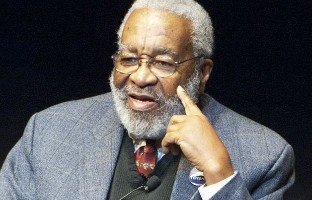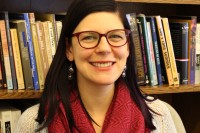Vincent Harding, a true hero

It is a special kind of sadness that lingers when a hero dies. We remember long afterward the way in which we heard the news. In the days following we find companionship in others who feel the way we do, as we recall the lessons we learned from the person who inspired us.
That kind of sadness has accompanied me since yesterday evening when one of my heroes, Vincent Harding, 82, a scholar and “veteran of hope,” went home to be with God. I lit a candle and gave thanks for this great man who had shared clear vision, bright passion, and inviting warmth.
I was honored to meet Harding years ago when I served on a panel with him and his wife and fellow worker for freedom, Rosemarie Freeney Harding, who died in 2004. (The subject was activism through the generations; I was 17.)
More recently I went to hear Harding when he visited Chicago in March. I and some of my favorite fellow Anabaptist ministers joined more than 200 people who gathered for a dialogue on ideas from his recent book America Will Be! Toward the beginning of his career, Harding ministered among Mennonites, too, including in the late 1950s and early ’60s when he was co-pastor of an interracial church on Chicago’s Southeast Side, the area where I currently work as a chaplain.
At the March event, instead of giving a lecture, Harding invited people to form small groups around several questions: “What is your dream of America? What could America be that it is not now? What could America be in its education system, health care system, transportation system? With its relationship to the rest of the world?”
 |
| Students and others gather around Harding in the Goshen College chapel. |
He noted that in a democracy the people have the responsibility to build a new country. “What does that new country look like in your dreams?” he asked.
This does not mean only looking to a positive future but also acknowledging mistakes of the past. “One of the great signs of maturity is the capacity to recognize where we’ve gone wrong,” he said, and to “go through and figure out what to do with it.”
With such wise words, Harding combined his sensibilities as a historian and as a pastor, calling us to face our human weaknesses and to learn from them, and from each other.
In an interview with the publication of the organization that brought Harding to Chicago in March, Harding commented on an insight received while attending a seminar on peace, learning, and dialogue:
I shared some of my personal experiences of dealing with death. This was important for me in the sense that I never before had taken the opportunity to contemplate the meaning of death. . . . I have lived a rich life, full of many, many gifts that I could not ever have imagined. So, it would be natural to assume that the continuity of life and death is not just the continuity of experience but the continuity of the quality of the experience. An understanding I gained . . . was that, just as I am grateful for the kind of life that I’ve been given, I will probably be grateful for the kind of death that I will be given as well. Somehow, the recognition of that continuity was a source of great joy for me.
Indeed, it is natural to imagine a rich, full life after death for our brother Vincent. He often drew on the great cloud of witnesses to revive his own hope. Now he has joined Sister Rosemarie and many others among those witnesses, urging us to to “not grow weary or lose heart” as we work for a more just and compassionate world.






